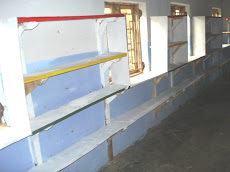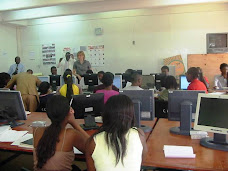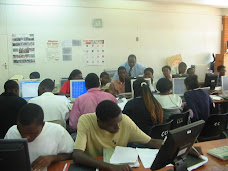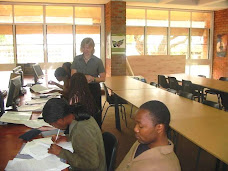Though I know many of you out there are waiting with great anticipation for the exhilarating story of the grading review meeting scheduled for today, I'm afraid you'll be overwhelmingly disappointed to find out that in the end I didn't make it there after all. I came to the office with the full intention of attending (though fashionably late by 15 mins., which appears to be somewhat standard here), I found the conference room locked. As I was walking away, a colleague from Social Sciences by the name of Sane (yes, as opposed to INsane, as he kindly obliged me in confirming) let me know that the meeting was postponed a few minutes due to a transportation scheduling issue involving the bus sent to collect faculty living off-campus. I then ran into the Dean, who said the department printer had run out of toner, so they were arranging to make copies in another office, but the meeting would begin 'at any time.' That said, Sane then assured me he'd check back in the conference room later on, and come to my office to let me know when the meeting starts.
So, I went back to the office, started my e-mailing/checking up on the world news daily ritual (some shocking stuff going on these days..), and as time went by, no Sane. Then, I started to think: "Should I check to see if the meeting started, or just wait for someone to come?" Hmmm... though I knew the responsible thing to do would be to go back and check, the other side of me really wanted to stay in my office and catch up on communications, as well as work on some of the Chanco research paper's I'd brought in with me. "Maybe just 5 more minutes," I thought. Then, about 20 minutes later, I realized, "Hmmm... some time has passed now... it might be rude to show up so late in the meeting. Maybe in a couple more minutes..." This went on for a good hour or so, until I decided it would be WAY too rude to show up that much later, not to mention I'd already committed to some other work, plus a much-needed international 'Skype' telephone conversation with my boyfriend back home.
Thus, I never made it to the meeting. In fact, I don't know whether the meeting actually took place, as Sane never did come over to my office to let me know. Not to say I'm too relieved, but well, I'm not a big fan of meetings... Is anybody? In a way, though, I was interested in how this one works, as it's culturally something new for me. The department faculty (in this case, Humanities) actually gets together (in this case, long after the end of the term which ended in September) to review the final grades for each course and make decisions based on whether the overall grade spread is too high or too low. If a course grade-spread seems to lop-sided, the faculty may recommend changing some of the grades in this meeting. Shocking, eh? Well, at least for me...
I learned from Mr. Mwanza (Deputy Principal at DCE) the other day that this is something the Malawians adopted from the British, who take pride in standardization, as well as keeping grades on the lower side. You really have to be extremely brilliant and exceptional to receive an 'A' in the British system. However, in the American system, this is not always the case, depending on the institution (and sometimes the region). It's one reason (among many) that our post-secondary institutions are sometimes accused of 'grade inflation.' In addition, the system here is very focused on end-of-term evaluations, rather than continuing assessment (i.e. projects, homework). In the U.S. (at least in my field), we tend to weigh more of our grading on work done throughout the term (i.e. homework, projects, periodic quizzes/exams etc.), and a bit less on final exams, which may account for only 20-40 percent of the final grade. Here, the final exams account for 60 percent of the final grade. Ya, for me, this is an extremely different approach to evaluation, reflective of an equally different view/theory on education/learning.
So, from that point of view, perhaps I missed out on something useful, at least in terms of how I approach my grading, as I must consider this as I finalize my grades this week with my Chanco students. I am finding, however, that the research paper (also being considered their final assessment, an exception approved by the dept. head at the end of the term, as I mentioned in an earlier post) has proven quite challenging for some of my students, so seems to be evening out the grades so that the curve should be acceptable enough to avoid any type of 'high' or 'low' general results.
Standardizing. Wow. This is tough for me. I like to give them what they deserve, not base it 'on a curve'. Ooh, I rhyming couplet. We were due for one of those...
Better end on that high note. Tiwonana mawa!
DISCLAIMER
This website is not an official U.S. Department of State website. The views and information presented are the English Language Fellow's own and do not represent the English Language Fellow Program or the U.S. Department of State.
Subscribe to:
Post Comments (Atom)







































































































































































































































































No comments:
Post a Comment